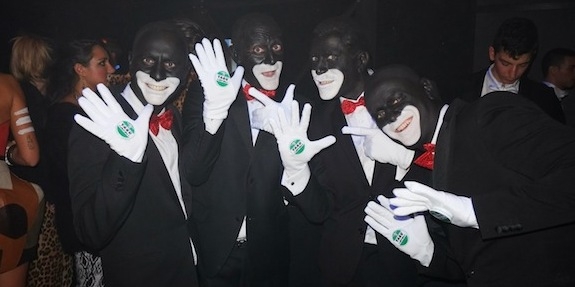A survey shows that South African whites are ahead of the Dutch in the ‘blackface’ debate.
With the legacy of apartheid still hanging over their heads and generally still a privileged minority, South African whites are often seen as one of the worlds’ more ‘racist’ population groups. But when it comes to the ‘blackface’ debate, they are much more aware of its racial context than, for example, the white population of the Netherlands, where an overwhelming majority still defends the ‘Black Pete’ character tooth and nail.
It’s just a joke, it’s dressing up, it has nothing to do with racism and what is all the fuss about? So what if white people dress up as black servants? It is just harmless fun and black people are way too touchy. Answers given by some white people in the context of a mini-survey (consisting of forty-eight street interviews) on ‘blackface’ practices in South Africa do echo the ‘Black Pete’ debate in the Netherlands.
Remarkably however, two-thirds of interviewed South African whites did show some awareness that ‘blackface’ is offensive and hurtful. In comparison, in the Netherlands, close to 95 % of its white population is defending the blackface ‘Black Pete’ character even in the face of criticism by the United Nations.
Painted faces, padded behinds
For the mini-survey, three reporters conducted forty-eight street interviews, randomly targeting people, -twenty- four white and twenty- four of colour-, in the streets of Pretoria, Johannesburg and Soweto. They asked people to comment on two recent ‘blackface’ incidents that occurred in South Africa. The first was a student party where two white women dressed up as black domestic workers. They had painted their faces black and also padded their behinds with pillows to make them look bigger and, presumably, ‘blacker’. There was an outcry in the media and they have since been suspended from their residences. The second incident was a dress up of two white men as Venus and Serena Williams.
The responses to the questions around the incidents show a still significant gap between white and black respondents twenty years after South Africa elected Mandela as its first black president. Black shoppers outside Pimville Square in Soweto reacted with anger to the incidents.
“We will always be seen as slaves in their eyes”
“We will always be seen as slaves in their eyes” one of them commented, referring to white people. Another black respondent, when asked if blackface was racist, countered: “Is Ebola a scary virus?” An overwhelming majority of black people also thought that white people were racially insensitive and that the ‘blackface’ practice was a product of racism and white privilege.
In contrast, though many South African whites (unlike most Dutch ones) seemed aware that there was a problem with blackface, they were not as clear on it as their black compatriots. Remarkably, they also seemed to oppose blackface more when talking to a black interviewer than when talking to a fellow white, leading the interviewing team to think that they were trying to avoid hurting black people’s feelings, whilst still privately reserving old attitudes.
Dinner party denial
One white respondent, arts teacher Erna Buber de Villiers (65), who agreed to be interviewed more extensively, offered to add to the survey by asking twelve fellow white guests at a dinner party what they thought.
“These political people should get over themselves”
The assumption was that these dinner guests, whom she knew, would feel less inhibited to share their real views than when asked by a black interviewer on the street. Buber de Villiers was shocked to discover that three out of five guests who were interested in participating whilst the rest were not interested at all, were of the view that blackface was innocent, that only ‘political’ individuals had a problem with it, and that ‘these people must get over themselves’. They were also unaware of the history of blackface as a way of poking fun at oppressed people, saying that ‘we would not be offended if blacks dressed up as whites’.
These arguments again resembled positions often heard in the ‘Black Pete’ debate in the Netherlands and confer to Dutch people the dubious honour of resembling guests (with an average age of 60) at a dinner party in the conservative ‘Boer’ town of Vereeniging.
Black Pete
In the end only slightly over a quarter of white South African respondents felt that blackface was connected to general white privilege and issues of race. A third still saw the practice as innocent, or ‘meant as a joke’ even if they were aware that black people could feel it is hurtful and offensive. The interviewing team notes therefore that more awareness needs to be raised around the issue in South Africa.
Regarding the amount of awareness-raising still needed in the Netherlands with regard to its ‘Black Pete’, the interviewing team politely declined to comment.
Find a description of the small-scale survey process and the interview data here.
For our Dutch readers, see here for more on 'Sinterklaas'.
Note: Sara Chitambo is a reporter and filmmaker based in Johannesburg. She conducted the interviews for this survey together with Nomalanga Nkosi and Martin Coetzee. Chitambo also compiled the findings. ZAM investigations editor Evelyn Groenink produced the final edit.


